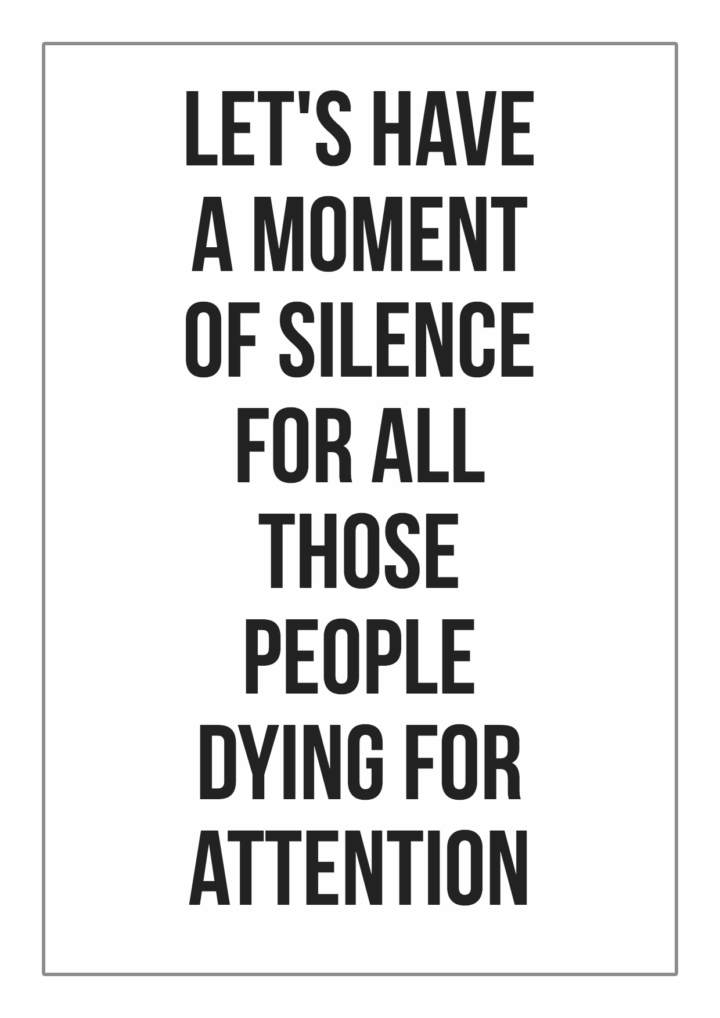For some people, the idea of trying to crave attention is a completely foreign concept. Even the thought of the room’s attention being on them is overwhelming sometimes. And seeing people lap up attention in as many settings as possible is utterly mind-blowing. This personality trait is just another one of the many things that make people different. And can cause a real divide or give rise to problems among friendship groups or work and social situations.
But, like with most characteristics, there is usually a reason behind someone’s attention-seeking ways. There are certainly ways for the more subtle people out there to deal with another person’s craving for attention. No matter the occasion. In this post, we are going to delve deeper into this concept and maybe help you achieve self-improvement.
Reasons why people crave attention
First and foremost, it’s good to understand why certain people do this and others don’t. Although there is no one definitive answer, there are several common reasons.
1) Habitual Behavior
Attention seeking is fairly common in young children, kids learn that if they create a scene they can end up getting what they want or they get the satisfaction on having all eyes on them making them feel like the most important person in the room. Although this is normal behavior in children, if parents are not firm in ignoring these habits, then attention-seeking children grown up to become attention-seeking adults. It is rarely appropriate to display attention-seeking tendencies as an adult, but these people have become so used to receiving what they want for much too long and now cannot change their mindset.
2) Jealousy
It is not unusual for someone to resort to attention-seeking when they are in a situation where they feel jealous. Jealousy can be due to many reasons, perhaps a woman is at the same party as her ex-boyfriend and his new girlfriend, maybe a kid who has been an only child for several years now has a sibling, or even a work colleague is being praised more frequently than they are. Whatever the reason, in the moment of jealousy, a common reaction from the jealous party is to crave attention, because all the while that they are getting attention then the person they are jealous if, is not.
3) To Off-Set Insecurities
Shy or insecure people are not often associated with any kind of attention-seeking behavior, however, this behavior can be the result of someone who is trying to hide their insecurities. It might end up coming off obnoxious, and not having the outcome the shy person was hoping for, but it is one of the easiest ways to deflect from any insecurities or social anxieties.
4) Narcissism
Of course, someone’s strong craving for attention might just simply be because they are a narcissist. Narcissists believe they are better than anyone else in the room, they usually have a superiority complex and one of the ways this manifests itself is through attention-seeking. Narcissists want everyone in the room to be looking at them, or listening to whatever they are saying because they believe they are the best person in the room, with the most important things to say. It’s like people who try and show-off their talents whenever the opportunity arises, for example, because they think it is better than everyone else’s.

How to Stop Being an Attention Seeker?
If you find yourself fitting into one of the above categories, or you are aware that you crave attention in some other form but want to stop, then, fortunately, there are ways to do this with some of the best methods outlined below.
1) Don’t Focus on Yourself
One of the best things you can do is change your focus to be about other people or other things. Sign up to be a volunteer at your local dog shelter, retirement center, or soup kitchen, maybe help out friends and family with chores or babysitting. You will be so busy thinking about helping others that you won’t have as much time to think about yourself, and over time the urge to seek attention will dampen.
2) Don’t Out Yourself in Triggering Environments
If your attention-seeking behavior is connected with jealousy then do everything you can to not be in those environments. Or simply walk away when they happen. If your ex is at a party, stay at home or go to the movies with friends instead. When you are jealous of a work colleague, move departments or make an effort to become friends with them. So that you no longer feel that they are a threat to you. Whatever environment brings out the worst in your attention-seeking, avoid it as much as possible.
3) Find the Cause
A good way to address a problem is to find the root cause. If you are attention-seeking, in order to stop, you need to know why. Keep a diary of how you feel, and what is causing the feelings. Are you covering insecurities? Are you attention-seeking to prove a point? Is someone making you feel inadequate? Do you think you are better than everyone else? Only you can know the true reason for your behavior. And if you can confront the reason then you can start working towards stopping the behavior.
How to Deal with People who Crave Attention?
If you are not the attention-seeker, rather, you find yourself not being able to handle being in the same room as an attention seeker. Then it will definitely make your life easier if you can learn how to deal with it, with the most important step being to ignore them.
Like how parents ignore their children until the child learns that attention-seeking doesn’t provide them with any rewards, you can do the same thing with adults. Simply ignore what the person is doing. Don’t acknowledge them, it will only encourage the attention-seeking. Even if it’s to acknowledge them in a negative way, it makes no difference. Do your best to zone out and go into a happy place in your mind until the moment has passed. The fastest way to stop an attention-seeker is to show no interest. They will not bother continuing if no one is paying them the attention they are craving.
Of course, if you have a good or close relationship with the person who is attention-seeking, you might be brave enough to have a serious conversation with them. Ask them to stop, even if they just stop when you are around. However, this is completely up to you to make this choice, and it depends on your relationship with them. How you think they will react? We don’t want to cause more problems, after all!

Attention seeking is a difficult thing to asses due to the high number of reasons that can cause it, it is difficult for a person to stop, and it can very difficult for a person to have to be around it, however, with a little patience and understanding from everyone involved things might start to get a little easier.
Tags: mind body and soul, personality traits





This article provides no greater insight into attention-seeking behavior than what the uninformed layman would conclude through anecdote and speculation. Despite its length, it appears to be little more than filler content of questionable accuracy, and the information is, at best, inconclusive.
The true reason for attention-seeking behavior is brain chemistry. Individuals who are acetylcholine-dominant and dopamine-sensitive are typically characterized as being introverted, while those who are dopamine-dominant and dopamine-insensitive are typically extroverted. A key neurotransmitter involved in social reinforcement is oxytocin, and those who have an optimal sensitivity to it are most adept at correctly identifying and interpreting the social coding and other nonverbal cues that are present in all human interaction. The extroverted and oxytocin-sensitive are predisposed to being rewarded by the novelty and stimulation that socializing provides, thus, they often learn that seeking attention is the means to satisfy their needs.
Individuals whose attention-seeking behaviors become disruptive likely have learned to satisfy their needs in an obtrusive or counterproductive manner beginning at childhood. As a consequence of an upbringing involving dysfunction or other emotional abuse, individuals develop rationalizations that afford them the greatest sense of well-being in such an environment. This is called maladaptive schema. It is the reason for and foundation of counterproductive (that is, anything other than secure) styles of attachment.
Before you write another article, please consider whether or not you are truly knowledgeable in your chosen topic. If you aren’t, unless you possess the skill (and most people don’t) to exhaustively research the subject matter to the point that you are able to ascertain the bounds of the existing knowledge, don’t publish anything intended to be informative. Filler content provides absolutely no value to those of us who are searching for specific information, and it only makes this task more difficult, as it only makes legitimate knowledge that much more difficult to locate.